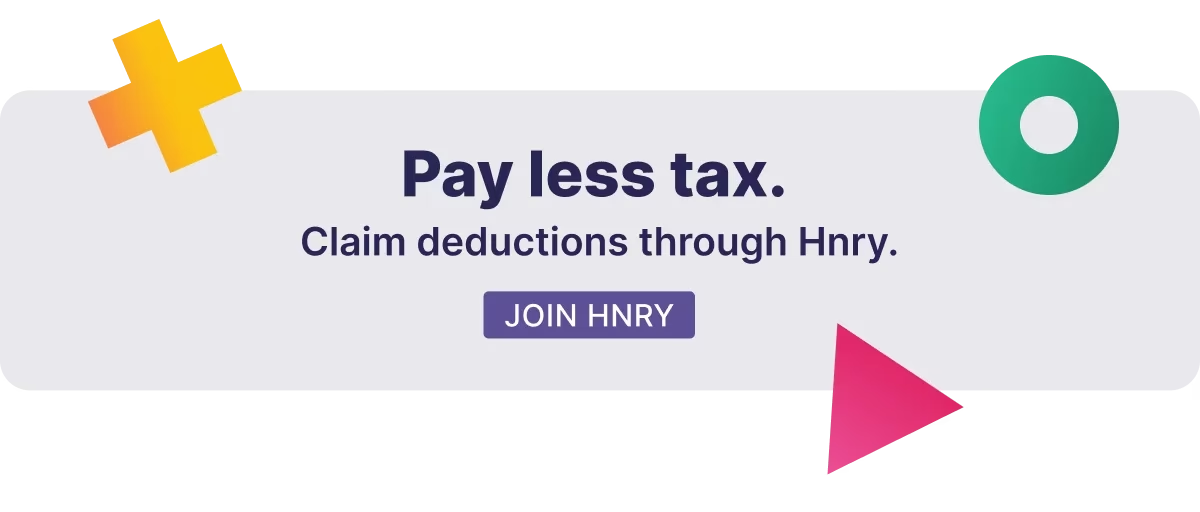In the sole trader community, tax misconceptions are as common as a morning cup of coffee. For starters, it’s so easy to get caught up googling “how rich people avoid taxes”, and be sucked down an absolute rabbit hole. There’s all sorts of misleading advice out there.
(Not that we’re saying you’ve done that. Juuuuust an example.)
To make life easier, we’re about to separate fact from fiction by busting the five most widespread tax myths there are. And then we’ll go a step further, by showing you the actual, smart strategies that can help you reduce your tax bill.
Ready? Let’s get stuck in
- Myth 1: Adopt a company structure
- Myth 2: Claim more tax deductions
- Myth 3: Buy more business assets
- Myth 4: Donate money to charities
- Myth 5: Hire part-time employees
- What you can actually do:
- Hnry can help you (legally) pay less in tax
Myth 1: Adopt a company structure
You may think that by registering as a company, you can funnel money through it and pay less tax on your earnings. Spoiler alert: Not true!
That’s because you’ll eventually need to get money out of your company: most commonly by paying yourself wages, or paying yourself dividends. In both cases, you basically end up paying the same amount of income tax as if you’d earned that money as a sole trader.
Let’s say you pay yourself wages. These would come out of your company before it pays income tax at the flat corporate tax rate of 28%. But your company would still need to deduct and pay your income tax, ACC levies, student loan repayments etc. for you, before paying you. You don’t save anything in income tax – and in fact, doing it this way just makes it harder to access your own money. Talk about paperwork!
If you decide to go down the dividends track, it’s a similar story. Dividends are paid from post-tax profit, so you’d be paid after your company pays the flat-rate 28% corporate income tax.
Your dividends would then have an imputation credit, indicating that a tax 28% has already been paid. You’re then essentially responsible for paying the remainder that you’d owe if the dividend had been straight income.
For example, if you are earning $54,000 and have a marginal tax rate of 30%, IRD would require you to pay the 2% difference when you file your personal income tax return.
And on top of that, there’s a heap of extra admin and complexity involved in running a company, including filing two tax returns (one for the company, one individual for you). In the long run, you could end up spending more time and money for little to no potential benefits (and likely more headaches!).
When all’s said and done, depending on your circumstances, it’s potentially much easier to be a sole trader.
Myth 2: Claim more tax deductions
When you run a business, you get to claim certain business expenses as tax deductions, which lowers your taxable income and therefore reduces your overall tax bill. Phew!
💡 If that last sentence reads like gibberish to you, don’t worry – we break it all down in our guide to claiming expenses.
But simply buying more stuff that you don’t need – even if it can reduce your tax bill – doesn’t make sense because you could end up spending more than you save. Tax deductions aren’t tax refunds!
💡 If that last sentence doesn’t make sense, we also have a handy guide to tax refunds. You’re going to be such an accounting whiz after reading it!
This includes things like forking out on more advertising, rebranding when you don’t need to, or marketing just for the sake of it. Of course every business needs to get in front of their ideal customers or clients, but spend your advertising dollars wisely, not just because you’re trying to save on tax.
Also, many sole traders get carried away and try to claim expenses on items and activities that aren’t directly related to operating the business. Claiming expenses can be a tricky business! It (literally) doesn’t pay to go around purchasing things you don’t actually need.

Myth 3: Buy more business assets
Got your eye on a high-tech printer or a fancy car to lower your tax bill? Hold that thought. Big-ticket items don’t offer the immediate tax relief many sole traders assume they will.
That’s because you have to depreciate any business assets that cost over $1,000. You don’t actually claim the value of the asset, you claim the depreciation of the asset – essentially the value the asset loses over time.
You know how they say a new car loses half its value as soon as you drive it off the lot? That’s depreciation in action (although that saying isn’t accurate – from the IRD’s perspective, your new car is worth what you paid for it unless you ding a pole on your way out of the car park).
Anyway, that large upfront investment only trickles back slowly over the years, until you’ve finally claimed the full cost of the original asset. It’s crucial to balance the immediate impact of a big purchase on your cash flow, against the longer-term, often minimal tax benefits.
By all means, invest in necessary assets; beware of shopping for tax reasons alone.
Myth 4: Donate money to charities
Giving to a good cause is admirable – but do it because you genuinely support a particular charity, not just because you’ll pay less tax!
For starters, it’s not even a full tax refund – it’s 33% of the original amount. So the amount you recoup won’t be anything near what you spent.
There are definitely better ways to reduce your tax bill, which we’ll cover in just a sec.
Myth 5: Hire a part-time admin employee
Yes, claiming a deduction for staff wages can reduce your taxable income, but the leap to hiring an employee should be about genuine business need, not tax strategy.
There’s a truckload of admin and compliance responsibilities that come with hiring an employee – think calculating and paying income tax for your new staff member, sorting their ACC levies, paying KiwiSaver, and more.
If you really need an employee, that’s one thing. But is it worth hiring someone just to reduce your tax bill? Nope.

What you can actually do:
Claim deductions for legitimate business expenses
The only surefire way to lower your tax rate is to claim expenses throughout the financial year, and actually reduce the amount of income that you’re being taxed on.
But the IRD has strict criteria on what you can and can’t claim for.Expenses must be related to earning business income, and be essential to running it. So if you’re a freelance graphic designer and need Photoshop to do your work, you should be able to claim a deduction.
But if you buy a sequined dress or a swanky suit to attend or speak at a business conference, you could still wear those items in a personal setting, so you likely can’t claim a tax deduction. Sorry!
Make sure you’re in the right ACC levy category
Everyone who works in New Zealand has to pay ACC levies – a type of public health insurance that helps you pay for medical costs, support at home and work, and any loss of income if you’re injured.
The amount you pay is based on your liable income, your work type, and what type of ACC cover you have (CoverPlus or CoverPlus Extra, which gives you even greater protection).
There are three categories of ACC levies: the Earner’s levy, Working Safer levy and Work levy.
While the Earner’s levy and the Working Safer levy are charged at the same rate for everyone, the Work levy is calculated based on your work type. The physically riskier your occupation, the more you have to pay.
Each occupation is assigned a work code, which indicates the Work levy rate for that role. If you’re using the wrong code, or if you fail to declare your work type, you could end up being charged more than you should actually owe. It pays (literally) to double check that you’re using the right category code!
Each year you’ll get an invoice to pay your ACC levy. You can try to calculate this by going to the ACC website or let Hnry do it for you.
Make the most of KiwiSaver contributions
KiwiSaver is a scheme that helps you save money towards your retirement. You choose an eligible provider as well as the type of fund you want your money invested in. As a sole trader, you’re completely in charge of contributing to your KiwiSaver account – there’s no minimum or maximum required.
But, if you contribute $1,042.86 of your own money into your KiwiSaver each financial year (that’s as little as $20 a week), the government will give you an additional $521.43 directly into your account. Nice, right?
Even if you don’t make the full $1,042.86 contribution, the government will still give you $0.50 for every $1 you put into your KiwiSaver account, up to that maximum of $521.43. To be eligible for the government contribution, you must be aged 18 to 65 and living in New Zealand.
Now, this isn’t strictly tax related, but it’s the closest to free money you’ll get! And who doesn’t want that?
Let Hnry take care of your taxes – the right way
Doing all you can to (legally) lower your tax bill is a smart way to take care of your cash flow. But there are rules in place to make sure everyone contributes their fair share. Remember, our taxes are used to fund a lot of public good, including many of the things we take for granted.
That said, no one wants to pay more tax than they need to, right? But as you can see, it’s easy to get caught out with some of the tax myths being peddled in the sole trader community and end up in a world of difficulty.
That’s where Hnry comes in – we help you get it right every time. For just 1% + GST of your self-employed income, capped at $1500+GST a year, Hnry will calculate and pay all your taxes, levies and whatnot for you, including:
We also file your annual tax return for you – it’s all part of the service! Better still, using the Hnry platform costs less than using a traditional accountant, and is entirely tax deductible.
If that sounds good to you, join Hnry today. Never think about tax again!
Share on:


